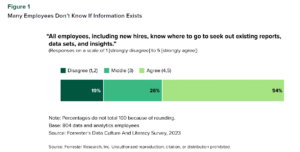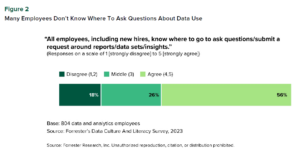
Data Culture ‘Half Baked,’ Forrester Says
(Rawpixel.com/Shutterstock)
Many employees don’t know where data is stored, how to access it, or what they’re allowed to do with it, according to a new Forrester report that casts doubt on the idea that large numbers of businesses are ready to step up and become data-driven.
For its 2023 Data Culture Overview, Forrester questioned 804 data and analytics professionals at UK and US companies with 100 or more employees about the level of knowledge employees have regarding data, dashboards, and insights.
Only 54% of the survey-takers said that all of the employees in their companies know where to go to data reports, data sets, and insights. By comparison, nearly 20% strongly disagree with that statement, while 26% are somewhere in between.
Similarly, only 56% said that all employees at the company know where to go to ask questions about the appropriate use of data, or to submit requests related to reports, data or insights. This results in “suboptimal outcomes where employees decide for themselves the acceptable use of data, guess at data interpretation, or abandon using data altogether,” Forrester analysts write in the report.
When it comes to data literacy, best practices suggest that a company have a point person who can training and help employees gain skills. Again, only 54% of the data and analytics professionals indicated their company or organization had such a person, according to the report, while 42% indicated that nobody had that responsibility, leading to a situation where “critical thinking skills suffer,” the analysts write.
The survey reports that 56% of analytics leaders say they have “access to in-house analytics communities” where they can network and communicate about data. Nearly one out of five (17%) disagreed with that statement while 27% were somewhere in the middle.
Forrester also found a gap existed when it comes to the level of freedom that workers have to ask data-related questions. Sixty-nine percent of all survey-takers said they work in an environment where all workers can speak up, but that figure was skewed by the seniority level of the analytics leaders. Fifteen percent more survey-takers high seniority levels answered positively to that question versus those with lower levels of seniority.
When it comes to trust in data, 41% of the survey respondents say their employees mistrust the data, while 34% said their employees don’t mistrust data and 25% were somewhere in between.
“This means that despite having access to insights, a lack of internal governance, a lack of good faith in behaviors of others, and a lack of positive data communications may negatively impact a staff member’s ability to trust that the insights they have are fit for decision-making,” Forrester analysts write in the report. “Without these, users only trust reports and data sets they built, sourced, or otherwise used themselves.”
All told, only 7% of the data leaders surveyed for the report have access to all six aspects of data culture. On the other hand, only 6% indicated that their organizations had zero support for all six of the measures. The average organization demonstrated proficiency (at least according to the data leaders surveyed by Forrester) in three out of the six areas, the analyst group reports.
“It’s clear that few organizations are perfect in terms of helping users seek, solicit, speak, and share data in psychologically safe environments, but there’s hope for data and technology teams,” Forrester analysts write. “Data, digital, and technology team leaders can leverage these insights and learn from each other to identify gaps or strengths unique to their own organization, and work with the North Star goal of increasing the overall speed by which employees can move from knowledge seeker to insights acquisition to action.”
Related Items:
Alation Releases New State of Data Culture Maturity Report





























